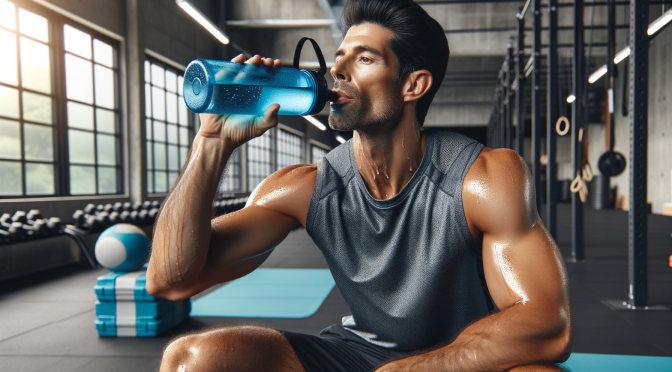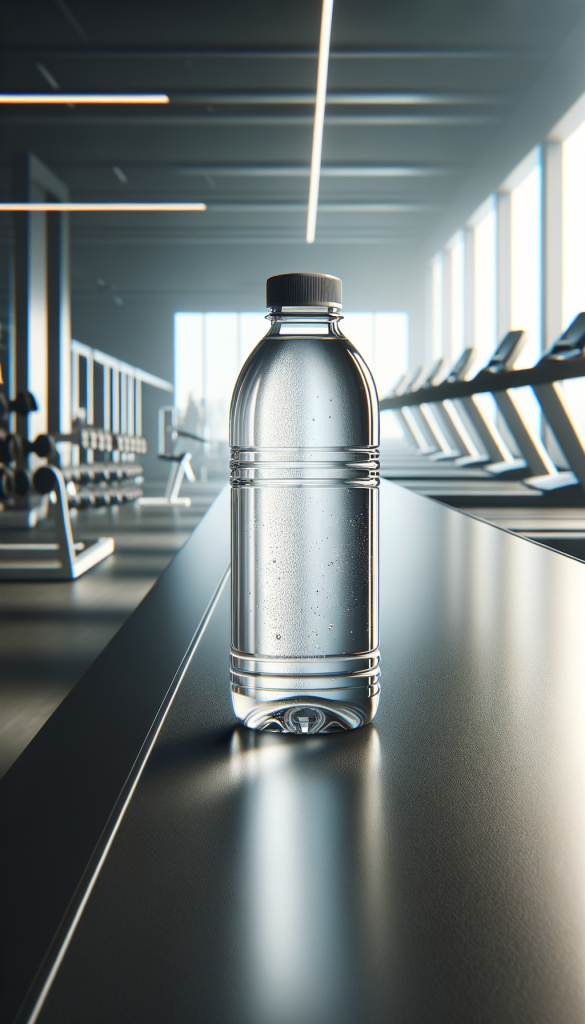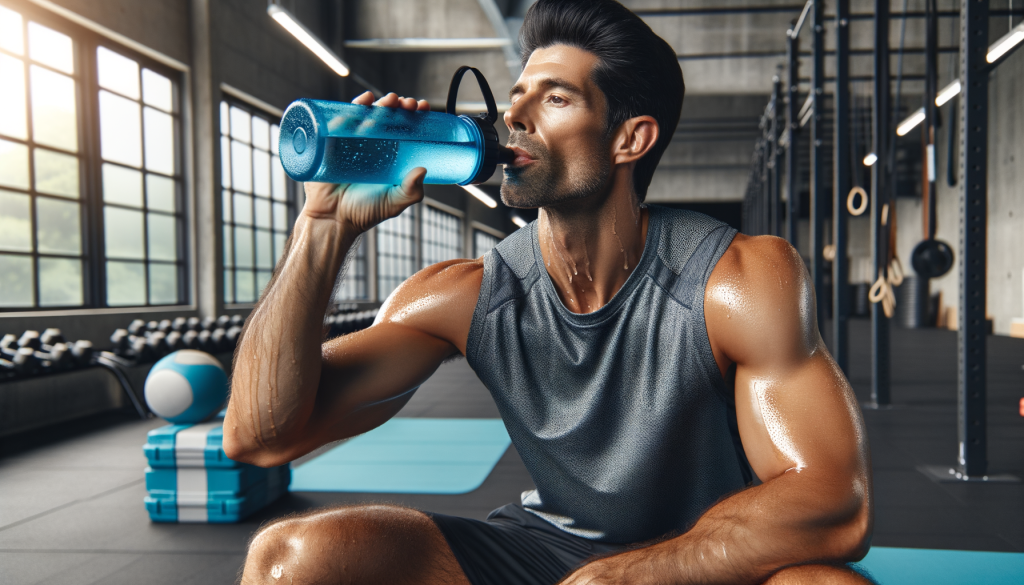
As an athlete, maintaining fluid balance is crucial to peak physical exertion, highlighting the importance of water for athletes in influencing sports performance. Even mild dehydration can affect your body’s ability to regulate heat and diminish your capacity to perform at optimal levels. It’s not just about quenching your thirst. Managing hydration involves careful thought about fluid intake before, during, and after exercise. This sustains efficiency and delays fatigue.
Your body loses water through sweat and breathing. This happens a lot during intense exercise or in hot or humid conditions. You must replace this fluid. It keeps blood volume right, regulates body temperature, and allows muscles to contract well. Drinking enough water or sports drinks in precise amounts can help to replenish lost fluids and electrolytes. This is vital for both your immediate performance and recovery.
A custom hydration strategy also helps move vital nutrients to your cells. It also helps remove waste from your body. Ignoring the signs of dehydration hampers your abilities. It can also lead to serious health problems. So, adding a good hydration plan to your diet can give you an edge. It can also help a lot in reaching your athletic goals.
Brief Overview of the Importance of Proper Hydration for Athletes
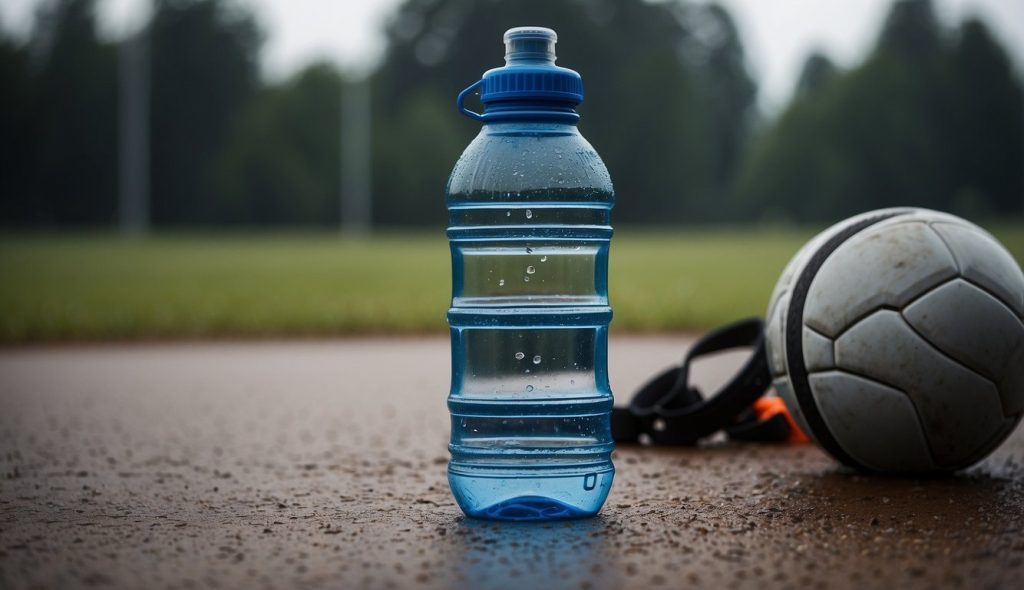
Proper hydration is crucial for maintaining your peak athletic performance. Your understanding of the body’s water needs during high-intensity exercise is essential for both health and competitive success.
The Human Body and Water
Water is fundamental to all your physiological functions. It plays a pivotal role in maintaining blood volume, blood pressure and regulating body temperature. During athletic activities, staying hydrated is essential to:
- Preserve balance: Adequate hydration ensures your body has enough fluids. This is vital to maintain electrolyte balance, which is crucial for muscle function.
- Support circulation: Drinking enough water maintains blood volume. This volume is vital for sending oxygen and nutrients to the muscles.
- Regulate temperature: As you exercise, your body temperature increases. Water aids in dissipating heat through sweat and evaporation, helping you to avoid overheating.
Hydration has a direct impact on athletic performance. When you’re well-hydrated, you can:
- Perform at a higher level for longer due to delayed onset of fatigue.
- Experience decreased perceived exertion, meaning activities feel less taxing.
- Recover more effectively post-exercise, as water helps flush out waste products from the muscles.
Proper hydration is not just about drinking water before exercise. It has pre-hydration. Then, maintaining a sufficient water intake during exercise. And rehydrating afterwards to replace lost fluid. Keep in mind: people’s hydration needs can vary. Factors such as exercise intensity, the environment, and sweat rates influence this.
Explanation of the Role Water Plays in the Human Body
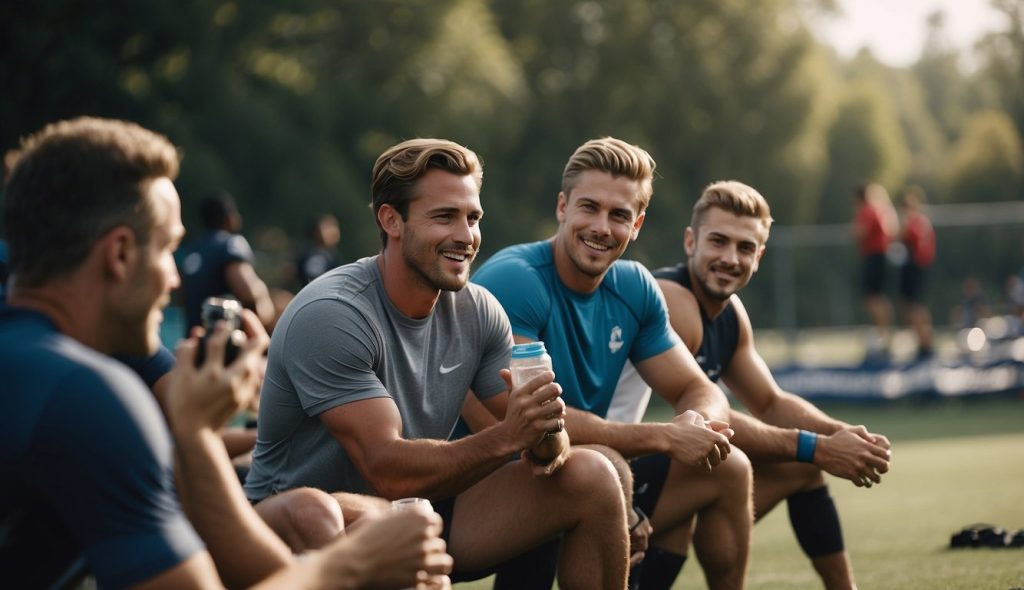
Water is fundamental to your existence and plays several vital roles within your body. Comprising about 60% of your body weight, water is crucial for various physiological functions.
Blood Volume and Circulation: Your blood is predominantly water; it accounts for roughly 90% of your blood’s composition. This fluid is crucial. It carries oxygen, nutrients, and hormones to cells. It also removes waste from cells for expulsion. Adequate hydration keeps your blood at the right volume. This is crucial for good circulation and heart health.
Regulation of Body Temperature: Your body’s ability to regulate temperature is heavily reliant on water. Water has a high heat capacity. It can absorb and release heat well. This helps keep your body’s temperature stable. When you exercise or are in hot conditions, your body releases water through sweat. Evaporating sweat from your skin cools you down.
Nutrient Absorption and Digestion:
- Water aids in the breakdown of food, facilitating the digestive process.
- Once your body extracts nutrients, water also plays a crucial role in carrying these nutrients to cells throughout your body.
Drinking enough water is crucial. This is especially true for athletes. It can greatly affect your exercise performance and health. Dehydration can impair your ability to perform at your best and lead to negative health outcomes. Thus, maintaining proper hydration is non-negotiable for optimal body function.
Discussion on the Percentage of Water in the Body
Your body’s water percentage is vital. It helps you stay hydrated and understand your needs, especially during activity.
Sweat Rate and Hydration
When you engage in vigorous sports or intense exercise, your body regulates its temperature through sweat. The rate at which you lose fluids in the form of sweat can significantly affect your hydration status. It’s not uncommon for athletes to experience sweat loss ranging from 6-10% of body weight during intense physical activity.
- Dehydration occurs if sweat loss is not adequately replaced with fluids.
- Monitoring your hydration status is crucial. A loss of just 2% of body weight from dehydration can impair your physical performance.
To maintain optimal hydration levels, consider the following strategies:
- Track your body weight before and after exercise to estimate sweat loss.
- Replenish fluids at a rate that corresponds to your individual sweat rate.
- Include electrolytes in your hydration plan to compensate for mineral loss.
How Sweat Rate Affects Hydration Levels During Exercise
When you exercise, your body regulates its temperature through sweating. The rate at which you sweat can significantly affect your hydration levels. Sweat rate varies. It depends on factors such as exercise intensity, the environment, and your physiology.
Why Sweat Rate Matters:
- Fluid Loss: During exercise, you can lose between 0.5 to 2.0 liters of sweat per hour. For some athletes, this number can exceed 3.0 liters. This fluid loss constitutes a direct reduction in your body’s hydration status.
- Hydration: Adequate hydration is crucial for maintaining performance. As your sweat rate increases, so does the need to replenish fluids to avoid dehydration.
Monitoring Sweat Rate: To manage hydration effectively during exercise, consider the following steps:
- Weigh yourself before and after exercise to estimate fluid loss.
- Drink fluids at regular intervals to match sweat loss.
Electrolytes and Sweat: While hydrating, remember that sweat also contains electrolytes like sodium. It’s not just about replacing water but also these vital salts. Inadequate electrolyte replacement can impair performance just as dehydration can.
Importance of Replacing Fluids Lost Through Sweat
When you exercise, your body loses vital fluids through sweat. You must replace these fluids. This keeps hydration at the levels needed for peak performance and recovery. They are essential for both.
Body Size and Fluid Needs
Your fluid needs vary based on your body size. To effectively manage hydration, consider the amount of fluids lost and your individual needs. For instance, a larger athlete will likely require more fluids than a smaller one due to greater sweat losses.
- Before Exercise: Drink 2 to 4 milliliters per pound of body weight at least two to four hours before exercise. This preps your body for the fluid loss to come.
- During Exercise: To stay hydrated, drink 200 to 300 ml of fluid every 10 to 20 minutes. You can adjust this amount to match your sweat rate.
- After Exercise: It is vital to replenish any fluid lost to ensure proper recovery. Aim for fluids that can also restore electrolyte balance. Sports drinks can help. They contain electrolytes like sodium. Sweat commonly removes sodium.
Keep a lookout for urine color, as a pale yellow color indicates good hydration. Remember, the goal is to prevent more than a 2% loss in body weight from fluids. This is the level where dehydration starts to hurt performance.
How Body Size Impacts Fluid Needs During Physical Activity
Your body mass is a significant factor when determining how much fluid you need during physical activity. Heavier athletes need more fluids. This is because they sweat more. You lose sweat as your body cools itself. Heavier athletes generally have a larger surface area. This can lead to more fluid loss through sweating.
Fluid Intake Guidelines Based on Body Mass:
- Lighter Athletes (<50kg): Generally, your fluid needs may be on the lower end of the spectrum. Start with 1.2 liters and adjust based on intensity and sweat loss.
- Average Athlete (70kg): You may require a higher amount, around 2.6 liters, to prevent dehydration over 2% body weight when in prolonged activity.
- Heavier Athletes (>90kg): You might need more than the average athlete. This is due to your greater muscle mass and potential for higher sweat losses.
Remember, hydration isn’t only about water intake. Your fluids include water and other beverages, as well as the moisture content found in foods. You should spread this consumption throughout the day. It should include drinks and foods with electrolytes. These help to balance fluid retention.
Guidelines for Determining Individual Fluid Requirements Based on Body Size
As an athlete, understanding your individual fluid requirements is crucial. These guidelines take into account your body size, a key determinant of how much water you need before, during, and after an exercise session.
Body Mass Changes: To start, examine changes in your body mass to gauge your hydration needs. An easy method is to weigh yourself both pre- and post-exercise. A change in body mass reflects your sweat loss, with each kilogram lost representing approximately one liter of body water.
Hydration Guidelines:
- Small body size (e.g., <50kg): Start with about 1.5 liters or 51 ounces of water a day. For every hour of exercise, consider 0.5 to 1 liter additional.
- Medium body size (e.g., 50kg-70kg): Begin with at least 2 liters per day, plus 0.7 to 1.5 liters for every hour of training.
- Large body size (e.g., >70kg): Start with a base of 2.5 liters and increase by 1 to 2 liters per workout hour.
Remember, this is a starting point; fine-tune these amounts by monitoring your hydration status.
Hydration Status Indicators:
- Thirst is a late indicator; staying ahead on your hydration is preferable.
- Urine color provides clues: aim for a light straw color.
- Rehydrate to counteract any body weight loss post-exercise as soon as possible.
Fluid replacement is essential to stay properly hydrated throughout your workout. Sip from a water bottle, or a sports drink if required, particularly during lengthy or intense sessions. Regularly assess your fluid needs as your training session demands and environmental conditions change.
Effects of Dehydration on Athletic Performance
Dehydration can severely hinder your physical capabilities and mental sharpness. As an athlete, understanding its impact on performance is critical. It’s key for maintaining stamina, power, and thinking during an exercise session.
Discussion on How Dehydration Can Impact Physical Performance
Dehydration happens when your body expels more fluids than it absorbs. This leads to a deficient volume of water needed for proper function. During physical activity, even a slight degree of dehydration can impair your performance. Dehydration makes your heart work harder. It raises your heart rate and body temperature. This strain can reduce endurance. It limits your ability to perform at your peak for long periods.
- Endurance: Losing more than 2% of your body weight in fluid can decrease endurance. This is especially true in warm environments, where your body needs extra fluid to cool down.
- Power: For power sports, dehydration can reduce your body’s ability to produce bursts of strength. These bursts are crucial for peak performance.
Examples of Decreased Endurance and Strength Due to Lack of Hydration
In endurance events, starting well-hydrated is essential. Small deficits in hydration can hurt your endurance. Your muscles need a balance of electrolytes and fluids to work well. Dehydrated muscles will experience:
- A quicker onset of fatigue.
- Decreased strength.
- Reduced muscle coordination.
Mental Performance and Hydration
Cognitive functions are equally vulnerable to dehydration. Dehydration can affect your ability to concentrate, make quick decisions, and stay focused. It can lead to difficulty focusing on tasks, strategies, or even navigating the course or field.
- Concentration: A lack of hydration can lead to difficulty focusing on tasks, strategies, or even navigating the course or field.
- Decision-Making: Mental clarity drops. So, making quick decisions becomes harder. This can be critical in high-stakes sports.
Stay vigilant about your fluid intake before and during exercise. It keeps both the body and mind sharp.
Importance of Water for Athletes: Frequently Asked Questions
Q: Why is water important for an athlete?
A: Water is crucial for athletes. It helps regulate core body temperature, lubricate joints, and transport nutrients for energy. During exercise, the body loses water through sweat. So, staying hydrated is key to prevent fatigue, muscle cramps, and dizziness. These issues can hurt performance. Proper hydration supports overall athletic performance and helps prevent dehydration-related issues.
Q: How much water should a athlete be drinking?
A: Athletes should aim to drink at least 8-10 cups (64-80) ounces of water per day, and even more if they’re exercising intensely or in hot weather. People’s hydration needs vary. So, it’s important to pay attention to the body’s signals. Drink water regularly throughout the day.
Q: Should athletes only drink water?
A: Water is essential for hydration. But, athletes can also benefit from other fluids. Examples include sports drinks or coconut water. This is especially true during intense or prolonged exercise. Then, they can replenish electrolytes and carbohydrates. Additionally, water-rich foods like fruits and vegetables can contribute to overall hydration. It’s important for athletes to choose a variety of hydrating options to meet their fluid and nutrient needs.
Q: Why is hydration and electrolyte balance important for athletes?
A: Hydration and electrolyte balance are crucial for athletes. They help regulate fluid levels in the body, keep muscles working, and support overall performance. During exercise, the body loses water and electrolytes through sweat. Keeping the right balance is key. It helps prevent dehydration, muscle cramps, and fatigue. Proper hydration and electrolyte balance help to maintain focus, endurance, and physical function. They are important during training and competition.
Q: Why is dehydration bad for athletes?
A: Dehydration harms athletes. It can cause decreased performance, muscle cramps, fatigue, and dizziness. In severe cases, it can cause heat illness. It impairs the body’s ability to regulate temperature and transport nutrients. This leads to reduced endurance and athletic function. Athletes need to stay well hydrated. It’s key for peak performance and health.

